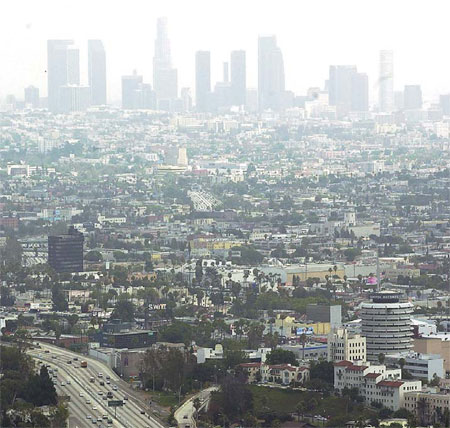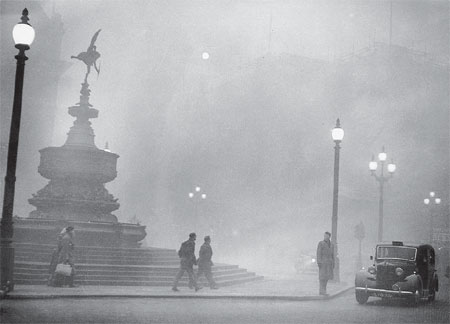Li pledges measures in fight for clean air
Updated: 2013-01-16 02:00
By Wu Wencong, Tang Yue and Zhang Chunyan (China Daily)
|
||||||||
Problems old and new
"Beijing suffers from both London's old problem (coal-fired power stations) and London's new pollution problem (traffic)," said Frank Kelly, professor of environmental health at London University's King's College.
"To improve air quality, the Chinese authorities will need to tackle both of these problems."
 |
|
The skyline of Los Angeles obscured by a heavy layer of smog and fog on July 15, 2003. Provided to China Daily |
During London's four-day Great Smog, "people who set off in their cars in what should have been daylight had to abandon them and walk, while buses gave up and crawled back to their depots in a nose-to-tail convoy", the Daily Telegraph reported at the time.
On July 26, 1943, a pall of smoke and fumes descended on downtown Los Angeles, cutting visibility to three blocks.
Because the "gas attack" hit in the middle of a heat wave, the atmosphere was close to unbearable, leaving residents with severely sore throats and stinging eyes, according to reports in the Los Angeles Times.
In 1953, heavy November smog in New York killed between 170 and 260 people. Meanwhile, in 1954, similarly severe conditions resulted in the temporary closure of businesses and schools in Los Angeles for most of October.
The incidents triggered a series of strict, detailed laws and regulations designed to combat air pollution.
 |
| Heavy smog in London's Piccadilly Circus in December 1952. Provided to China Daily |
London’s great smog led to the enactment of the first piece of legislation to specifically target air pollution in the world, the Clean Air Act of 1956, which was later amended and extended by the 1968 Clean Air Act.
The acts regulated the burning of solid, liquid and gaseous fuels, and increased the height of new industrial chimneys, that had not been included in previous legislation.
The efforts made by the UK government and residents were finally rewarded when the number of foggy days in London was reduced from several dozen per annum to 15 in 1975, further improving to just five days per year in 1980.
Meanwhile, the US has improved air quality by instigating strict emission standards on power plants, factories and automobiles.
The heavy smog in Beijing during the past few days has not only prompted heated discussion about comparisons between the three Western cities and the Chinese capital, but also led the public to ask questions such as, “What can we learn from the experiences of London and LA in tackling pollution”. More directly people have asked, “Do we stand a chance of seeing the end of incidents such as these?”
- Quality of air remains a global concern
- Guangzhou sets clean air quality target for 2015
- Shoppers snap up air purifiers to beat the smog
- China orders more air quality early warnings
- Cold front to clear Beijing air
- Reducing air pollution
- Haze drives demand for clean air products
- Healthy debate over air
- Beijing air pollution reaches dangerous levels

 Li Na on Time cover, makes influential 100 list
Li Na on Time cover, makes influential 100 list
 FBI releases photos of 2 Boston bombings suspects
FBI releases photos of 2 Boston bombings suspects
 World's wackiest hairstyles
World's wackiest hairstyles
 Sandstorms strike Northwest China
Sandstorms strike Northwest China
 Never-seen photos of Madonna on display
Never-seen photos of Madonna on display
 H7N9 outbreak linked to waterfowl migration
H7N9 outbreak linked to waterfowl migration
 Dozens feared dead in Texas plant blast
Dozens feared dead in Texas plant blast
 Venezuelan court rules out manual votes counting
Venezuelan court rules out manual votes counting
Most Viewed
Editor's Picks

|

|

|

|

|

|
Today's Top News
Boston bombing suspect reported cornered on boat
7.0-magnitude quake hits Sichuan
Cross-talk artist helps to spread the word
'Green' awareness levels drop in Beijing
Palace Museum spruces up
First couple on Time's list of most influential
H7N9 flu transmission studied
Trading channels 'need to broaden'
US Weekly

|

|







